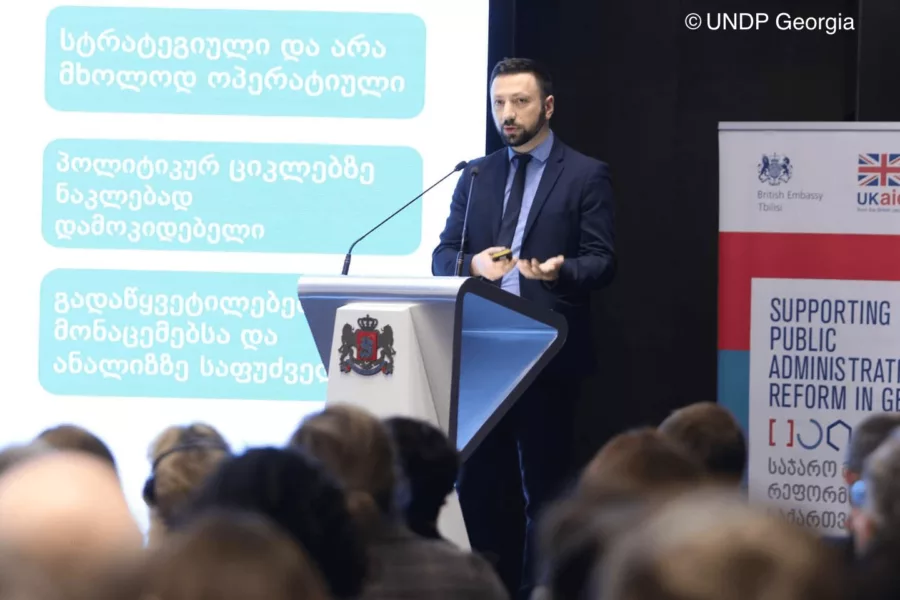Increasing Effectiveness and Accountability of Georgia’s Public Sector

Georgia is striving towards the modernisation of its public administration. The process is seen as a prerequisite of the country’s EU integration and is therefore a key national objective. One of the central components of the country’s public administration reform plans is the development of an evidence-based policy-making system that responds to real needs and ensures a long-term approach to each policy challenge. As Head of Policy Planning at the Prime Minister’s Office, JST Fellow Giorgi Bobghiashvili (Georgia, 2019), has been a driving force in delivering this area of reform.
Giorgi has been central to bringing about a recent government decree which obliges all ministries and public agencies to adopt standards and methodologies incorporating best practices in evidence-based policy-making. The decree has been accompanied by a supporting Handbook on Public Policy Making, which is the primary guidance document for ministries in the process of planning, monitoring and evaluating policies of the Government of Georgia. According to Giorgi, this has been “a huge personal achievement, which will really benefit the country’s development.”
Georgia’s Public Administration Reform was also the focus of Giorgi’s Action Plan during his JST Fellowship Programme. Back in 2019, Giorgi planned to develop a training programme for civil servants to transform government policy planning and coordination and he used his individual meetings with counterparts and experts in the UK to gather useful information and build his network of contacts. As Giorgi explains, “the UK was one of the first to introduce a consolidated evidence-based policy-making approach in the 1990s, so I was lucky to meet with professionals of such a long standing!” Giorgi also had a chance to participate in a policy-making experimentation workshop organised by the Policy Lab at the Department for Health and Social Care. Of all his meetings, Giorgi’s plans were most influenced by the information he gathered and the contacts he made with the Cabinet Office, Government Digital Service, Oxford Policy Management, and Public Administration International (PAi).
Upon returning to Georgia, Giorgi embedded some of the UK’s best practices in the government decree he worked on and set about developing a major capacity development initiative for public servants, focusing on enhancing skills and changing mindsets. With support from the British Embassy in Tbilisi, UK Aid and the UNDP, Giorgi launched a training programme for Georgian public servants on evidence-based policy-making based on the UK’s experience of public policy analysis. More than 100 public servants from 20 public entities have been trained and coached so far.
Positive changes are already being seen in how public servants are working, according to Giorgi: “evidence is becoming a cornerstone of planning sector policies; public sector institutions have started to use key performance indicators to measure effectiveness of their policy interventions; policies have become more long-term oriented; participatory approaches and public consultations are now obligatory for the sector policy planning process; public agencies are now required to provide and publish monitoring and evaluation reports significantly increasing their accountability, but most importantly, public servants have a more results-oriented mindset now when approaching sector policy planning.”
Giorgi recognises that, as with all reform processes, it will take more time before the impact of these changes are felt in Georgian society, but he is proud to have contributed to the Georgian public sector taking its first steps to increase its effectiveness, accountability and sustainability. Giorgi says that the JST Fellowship was “a unique opportunity to learn, observe, connect, and most importantly, get inspired to make positive changes back in our countries, which look up to the UK as a role model.”
July 2021
